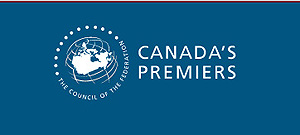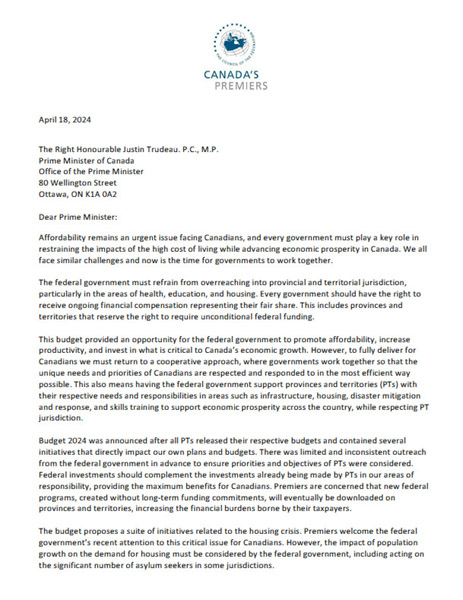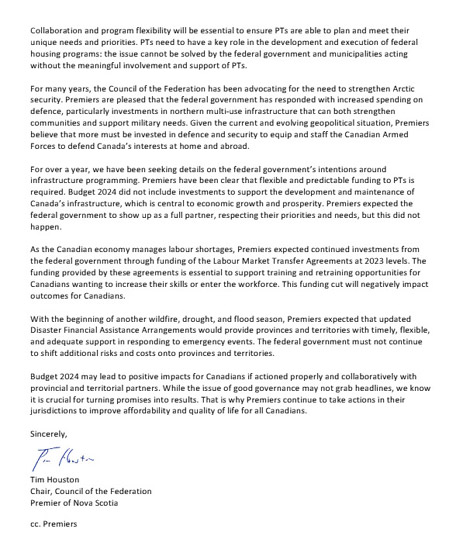Friday April 19, 2024 | VICTORIA, BC
Editorial political by Mary P Brooke | Island Social Trends
Provincial and territorial premiers are usually pleased to receive funding from the federal government for things that are provincial jurisdiction. They are slowly becoming comfortable with having obligations to meet (i.e. strings attached) in order to receive those funds for things like health, education and housing.
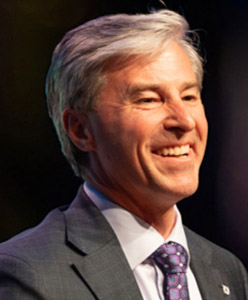
But today a letter came from all the premiers (sent by Nova Scotia Premier Tim Houston on their behalf) expressing discomfort with how the federal-provincial dynamics are evolving.
“The federal government must refrain from overreaching into provincial and territorial jurisdiction, particularly in the areas of health, education, and housing,” the letter dated April 18 stated.
Much of the realm of Canadian intergovernmental relations at all levels deals with jurisdictional lines. Elected leaders are quick to point out what they are responsible for and what others are responsible for. And usually there isn’t much of an overlap or mix except by deliberate agreement.
Federal doing best for Canadians:
Finally the prime minister — late in his now nine years in office — is flexing the degree of policy impact that might have been more helpful to his government if done earlier in his time in office. Provinces have complained over the years that they don’t get enough federal funding for health and housing, and for newer services-by-policy such as child care. Then when the federal government steps up, there is pushback.
Today Trudeau said during his media availability held at the University of Victoria that he always enjoys working with the provinces but will go around them as necessary to do the best for Canadians.

Our focus as a government is about working with provinces to deliver for Canadians. He pointed out that BC “led the way with the BC Builds program which we’ve actually adopted”. The federal government will match provincial dollars for building housing that is affordable “and make sure that even more gets done”, Trudeau said today.
“That’s the way the federation should be working,” said Trudeau. “We hear provinces are upset because we’re signing deals with big cities, putting money in the cities’ coffers so that they can increase density, so that they can build more homes faster,” said Trudeau in his media availability in Victoria.
“Provinces that are not getting ambitious on housing while people in their provinces still deserve to have solutions to the housing crisis — even if the province doesn’t want to step up with the same level of ambition,” said Trudeau.
“I am unabashed about saying I am ambitious to solve problems for Canadians right across the country. I am ambitious about investing in solutions to make sure our economy is fair for every generation,” said Trudeau, adding: “I’m going to work where I can — in partnership with provinces that want to, like BC and others have.”
“Places where they want to block the kind of investments that are going to help Canadians, I’m just going to try and figure out ways to help Canadians directly as necessary,” said Trudeau with some additional vigor.
“I’d always rather work with provinces. But if we have to, I will go around them and be there for Canadians. Because this economy deserves young Canadians getting the support they need,” the prime minister said today.
Still want unconditional funding:
With their April 18 letter the premiers are calling the ‘jurisdiction card’ and that they “reserve the right to required unconditional federal funding”.
In normal life, receiving funding without conditions would be highly unusual, if not suspect. That the federal government has come forward to ways to help (although late in the game) is probably appreciated by most Canadians who might begin to express concern that they needs in health-care and communities are possibly being thwarted because premiers resist accountability.
It should be noted that in the last couple of years British Columbia has welcomed reasonable agreements with the federal government in order to receive additional funding for things like health-care, housing and child care.
However, given how programs and commitments do change depending on the political stripe or a government or the inclinations of a leader, the premiers express a legitimate concern: “New federal programs, created without long-term funding commitments, will eventually be downloaded on provinces and territories, increasing the financial burdens borne by their taxpayers.”
Yet the premiers of the provinces and territories (PTs) offer their involvement right up front: “Collaboration and program flexibility will be essential to ensure PTs are able to plan and meet their unique needs and priorities. PTs need to have a key role in the development and execution of federal housing programs: the issue cannot be solved by the federal government and municipalities acting without the meaningful involvement and support of PTs.”
So it’s a case of wanting the money, realizing they need the money, but putting up enough of a fuss to assert boundaries. All in all, it looks like Canadians might indeed benefit by the Liberals rolling out funding for all the provincially-based programs, even with formal agreements required. No more free lunch (some provinces have, in the past, accepted money for one thing then spent it on another).
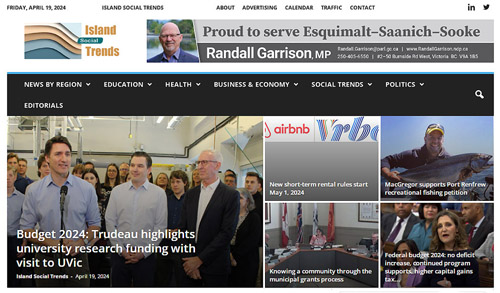
===== ABOUT THE WRITER:
Island Social Trends Editor Mary P Brooke has been covering news with political analysis on south Vancouver Island through a socioeconomic lens since 2008.
Her publication series: MapleLine Magazine (2008-2010), Sooke Voice News (2011-2013), West Shore Voice News (2014-2020), and now Island Social Trends (2020 to present).




